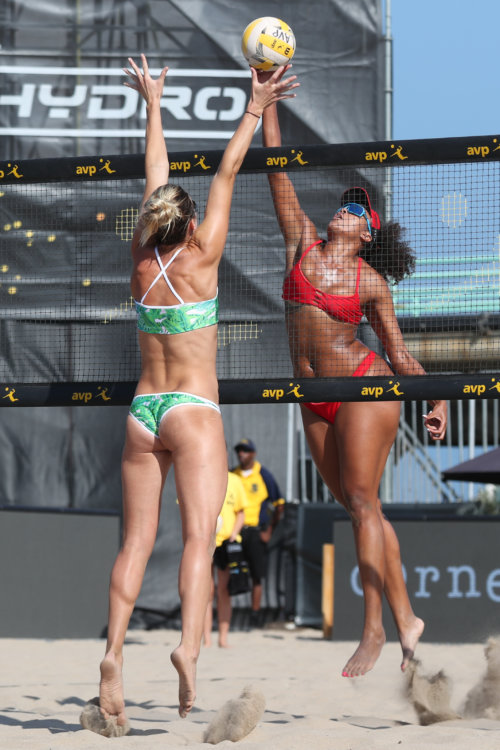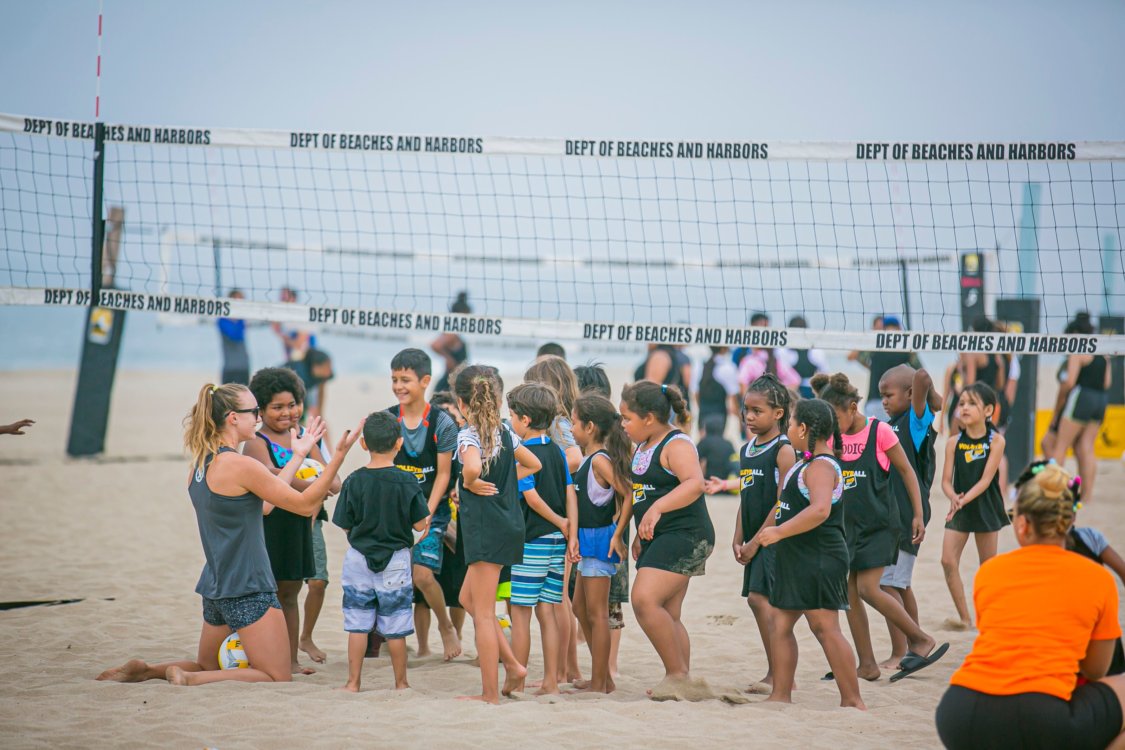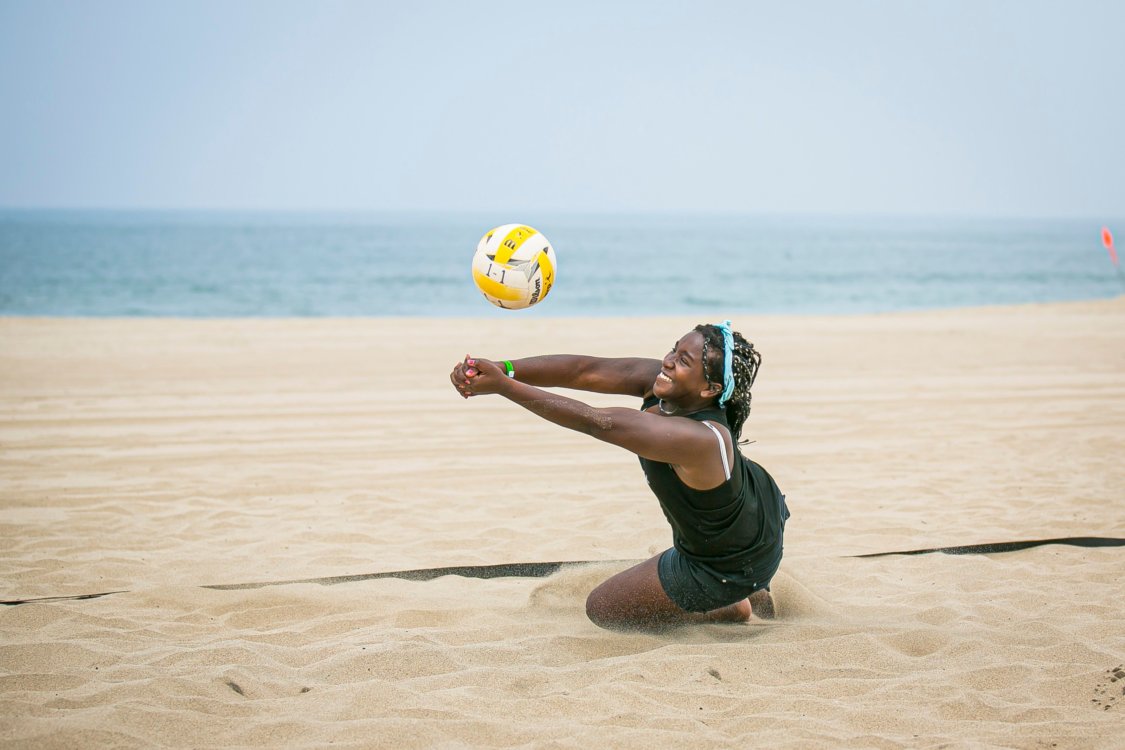In our first two conversations, AVP blocker Falyn Fonoimoana shared her stories on judgment, her personal encounters with racism, the complicated conversations with her young son, and the social injustices of the summer. Before you dive in here, I hope you go back and read those; Falyn is brave, sensitive, and patient in her views on these tough issues. Her opinion and voice are valuable and deserve your time.

To finish our three-part series, Falyn and I discussed what the AVP and our community as a whole can do to ally with the Black community and make sure beach volleyball is inclusive, diverse, and accessible to all. Particularly to children in underserved communities, giving them the same advantages as so many beach volleyball pros had when they were children.
When it comes to white allyship, Falyn encourages me and the AVP community to stay informed. “With education,” she says, “you’re going to get strength and confidence in your words and be able to speak on the [social injustice] issues. And don’t try to research and educate yourself on everything at once; start with picking two things a week.”
But more than just doing the research, she recommends absorbing and understanding the information until it shapes your beliefs. Make an informed decision and opinion based on your research and education on the systemic injustices rather than just spewing other people’s opinions. We both agree that the last thing the world needs is more half-informed, spoonfed information regurgitation.
Falyn points out that this work is also an act of kindness to others. “Reiterate learned information in your own words,” she advises. “Then it doesn’t feel so rehearsed; people don’t feel attacked, and they’re able to digest what you said. Because you did the research, educated yourself, and are authentic to your beliefs – your community will trust your words.”
Another key to allyship is accountability. Falyn says, “Black people should not have to check white people. It should be white people checking other white people in public, in private, or maybe even in a joke. This is important for everyone to keep each other accountable, so this is no longer a conversation for our children. I don’t expect it to stop, but I expect steps to be taken.” When we challenge what White Fragility author Robin Diangelo calls “white solidarity,” we open up the channels of change.
But beyond what Falyn asks of white allies, she urges all people to raise their social consciousness and keep the conversation going. She summed it up perfectly when she said:
“Two things I think everyone needs are:
- Patience; on both sides. Patience for your Black friends because they’re going through a ton of emotions – happiness, sadness, anger – all in one day. Or maybe in just the last hour. And patience with your white friends once they realize it’s not a Black vs. white issue – this is a human race issue that everyone needs to help solve.
- Compassion. There are hundreds of years of pain that the Black community deals with daily. Generational issues with injustice plague our families; it’s forever on our minds. So really it’s about sensitivity and compassion. Maybe say, ‘I don’t know how you feel, but I want to be there for you and have the opportunity to understand why you feel this way.’ Understand that Black people lived a different life than you, and there’s something to be gained from asking questions and listening.
It’s not that I have all the answers, or that you have all the answers. It’s just coming together as a human race saying this is an issue, and something’s wrong. We all need to come together to fix it.”
Now, how does this translate for the AVP and the impact they have in the sport and our community? Falyn recommends we continue the work of AVPFirst, but on a larger and more local scale.

AVPFirst is the philanthropic arm of the AVP. They’ve worked with YMCAs, Boys and Girls Clubs, and a handful of local community organizations at all the Pro Tour stops. AVPFirst Director Tony Giarla says, “We’ve created access and opportunities for over 10,000 kids to play beach volleyball.” They’ve donated more than 1,000 volleyballs and 20+ portable net systems to program partners across the country, as well as 450 tons of sand to Gahr High School to build a new 2-court facility.
The LA area is a trove of richly diverse communities waiting to be served by an organization like AVPFirst. Falyn would love to see AVPFirst expand their local involvement more, cultivating altruism more frequently and in our backyard. “Let’s get deep into Los Angeles,” Falyn says, “and take those kids to the beach. Have it be a field trip after a half-day of school. Take them down to Playa del Rey or Santa Monica and let the kids experience the beach; it’s a whole different world over there. They need to experience that along with people caring about them enough to teach them volleyball.
“We can gift them backpacks with our healthy hydration powders, PowerCrunch bars, and a Wilson ball. Give them something to remember, because these kids are going to keep that forever and think, ‘Remember that one day where we didn’t have to live our lives? When we got to be us?’ Our impact on these kids shows them there’s more to life than what they’re living.”
I’ve had conversations with AVPFirst’s leadership team and they take this responsibility of impact seriously. They’ve grown their program year over year to impact more communities, and are looking to do much more. Over the next 45 days, the AVPFirst Board of Directors will be involved in several strategic summits to discuss growing and empowering the AVP’s community outreach arm even further in 2021. Many exciting things are on the horizon, and I’ll be updating you as they develop.
